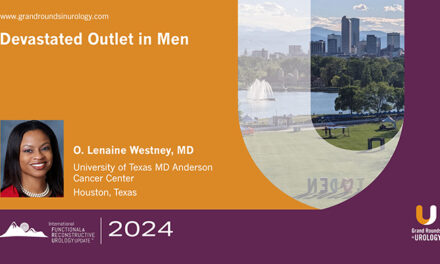Maria Uloko, MD, presented “Common Drug-Induced Sexual Dysfunction in Men” during the 30th Annual Perspectives in Urology: Point-Counterpoint, on March 10, 2023, at Humphreys Half Moon Inn, San Diego, California.
How to cite: Uloko, Maria. “Common Drug-Induced Sexual Dysfunction in Men.” March 10, 2023. Accessed Jul 2025. https://grandroundsinurology.com/common-drug-induced-sexual-dysfunction-in-men/
Common Drug-Induced Sexual Dysfunction in Men – Summary
Maria Uloko, MD, discusses symptoms, causes, and treatments of post-finasteride syndrome (PFS) and post-SSRI sexual dysfunction (PSSD) in men. She begins by defining PFS, noting its controversial status in urology. Dr. Uloko outlines PFS symptoms, including depression, suicidality, and anxiety. She explains that these psychiatric symptoms often worsen when medical professionals dismiss them as results of finasteride use.
Dr. Uloko then considers the incidence of PFS, emphasizing the need to study PFS in the treatment of male pattern hair loss and highlighting the NIH’s inclusion of PFS in its 2015 list of Rare and Genetic Diseases. She discusses how 5-alpha-reductase inhibitors cause PFS, later evaluating the results of androgen deprivation in animal models as well. This leads Dr. Uloko to highly recommend validating patient concerns. She completes her discussion of PFS by advocating for a biopsychosocial approach to treatment, noting the importance of medication cessation and educating patients.
Dr. Uloko proceeds by discussing PSSD in men. She first reviews PSSD and its symptoms, noting that the prevalence of persistent sexual side effects following SSRI discontinuation is unknown. She lists common SSRIs and explains their use in treating depression and premature ejaculations. Dr. Uloko then discusses how discontinuation of the drug can increase serotonin activity. She explains how serotonin negatively affects sexual factors, signaling PSSD’s mechanism of action. Dr. Uloko transitions into a discussion on the pathophysiology of PSSD and explores the debate surrounding this topic. She then focuses on PSSD treatment, proposing that urologists utilize a biopsychosocial approach and address correctable factors. She concludes her discussion by emphasizing the need for patient validation and further research on PFS and PSSD.
About the 30th Annual Perspectives in Urology: Point Counterpoint conference: Presented by Program Chair and Grand Rounds in Urology Editor-in-Chief E. David Crawford, MD, this conference brought together leading experts in urology, medical oncology, and radiation oncology to discuss and debate the latest topics in genitourinary cancers, primarily prostate cancer and bladder cancer. This interactive conference offered topical lectures, pro/con debates, interesting-case presentations, interactive panel discussions, and interactive audience and faculty networking.
ABOUT THE AUTHOR
Maria Uloko, MD, is a urologist who specializes in the treatment of female sexual dysfunction, female sexual pain, low libido/desire, regenerative ED treatments, advanced erectile dysfunction, symptomatic menopause, atrophic vaginitis, urologic prosthetic surgery, Peyronie's disease, and hormone therapy. Dr. Uloko has expertise in providing gender-affirming care to transgender and nonbinary patients.
Dr. Uloko is an assistant professor at UC San Diego School of Medicine, she is involved in training medical students, residents, and fellows in urology and sexual health.
Dr. Uloko completed a fellowship in comprehensive sexual health with a focus on prosthesis/reconstruction at San Diego Sexual Medicine and Scripps. She completed residencies in urology and general surgery at the University of Minnesota Medical School in Minneapolis and earned her medical degree from the University of Missouri - Kansas City School of Medicine.
Dr. Uloko is a strong advocate of improving the quality of life of her patients by providing a comprehensive, compassionate, and inclusive approach to often stigmatized subjects. She believes in empowering her patients to take ownership of their sexual health by providing a shame-free space to ask questions and share their stories. She seeks to close gaps in care disparities and implement systems that promote diversity and inclusivity.





